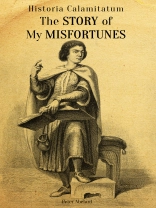Historia Calamitatum (known in English as The Story of My Misfortunes or The History of My Calamities) is an autobiographical work in Latin by Peter Abelard, a medieval French pioneer of scholastic philosophy. The work is one of the first autobiographical works in medieval Western Europe, written in the form of a letter (and, as such, is clearly influenced by Augustine’s Confessions). The letter is an extensive and honest self-analysis of Abelard up to the age of about fifty-four, and provides readers with knowledge of his views of women, learning, monastic life, Church and State combined, and the social milieu of the time. It should be particularly noted that the work was written at a time when Western Europe had only recently surfaced into the world of philosophy. Abelard emphasizes how persecuted he feels by his peers throughout the work. He quotes saints, apostles, and at one point, compares his struggles in likeness to those of Christ.
A propos de l’auteur
Peter Abelard (c. 1079-1142) was a medieval French scholastic philosopher, leading logician, theologian, poet, composer and musician. In Catholic theology, he is best known for his development of the concept of limbo, and his introduction of the moral influence theory of atonement. He is considered (alongside Augustine of Hippo) to be the most significant forerunner of the modern self-reflective autobiographer. He paved the way and set the tone for later epistolary novels and celebrity tell-alls with his publicly distributed letter, The History of My Calamities, and public correspondence.












